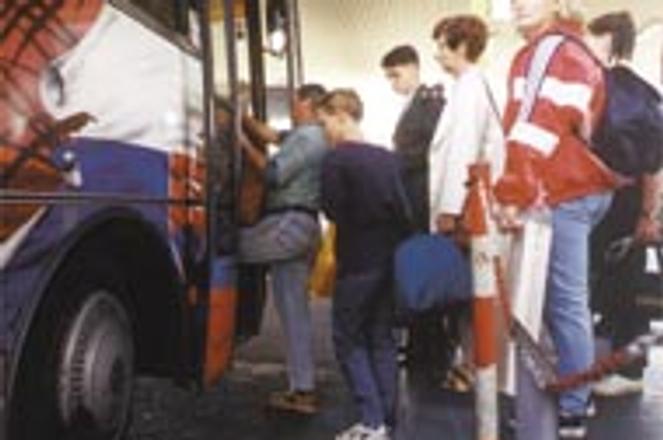Getting gouged. Foreign tourists travelling on Slovak bus lines may pay over twice as much as Slovaks.Vladimír Hák-Profit
Nathan Wood, an American tourist visiting Slovakia, was shocked to find that a few days in Bratislava cost him almost as much as he was used to paying in western European cities. "Everything was more expensive than I thought. Because I was a foreigner, I had to pay around twice as much for a hotel room, and over three times as much for travel tickets. I was very angry. It's discrimination," he said.
Hotels and travel companies quoting two prices - a modest sum for locals and a higher fee for foreign visitors - have long been a feature of the tourist landscape in Slovakia. But now that the country is gearing up for possible entry into western structures like the European Union, voices are being raised in criticism of the discriminatory practice.
A straw poll of 14 hotels from the Bratislava and High Tatras regions confirmed that hotels were indeed offering two different rates, with the tourist fees as much as 125% higher than the Slovak rates (see chart, this page).
Alena Silonová, marketing manager for the Agency of Tourism Development in the Tatra region, a popular mountain destination in northern Slovakia, said the reasons behind the double prices were self-evident.
"Foreigners can pay more," she argued. "Domestic prices are very cheap for foreigners, but many domestic people who earn only a few thousand crowns per month cannot afford to pay foreign prices."
The relative poverty of Slovak citizens was a defence popular with hotel managers as well. Milan Kopian, manager of Hotel Bratislava, said the reason his hotel charged foreigners 75% more than Slovaks "is that Slovaks have lower incomes and foreigners have bigger incomes." Alena Srbeca, front office manager of Hotel Tatra, also reasoned that "our people do not have as much money as foreigners do."
Silonová added that the prices for foreigners in Slovakia still compared well to those charged by other European destinations. "Prices [in the Tatras] are still cheaper for tourists when you compare them to those in the Alps. Granted, services may be better in the Alps, but the Tatra environment is still beautiful and the prices are not so high. And if we go to all foreign prices, we will lose domestic clients."
But Silonová bristled at the suggestion that double pricing was a form or discrimination. "The difference in prices is more like a discount for domestic people," she said. "The foreign prices are the official prices but we must give a discount to Slovaks to give them a chance."
European dreams mean fair prices
Given the pro-western focus of the new cabinet, however, price differentiation may rapidly become a relic of the past.
Economy Minister Ľudovít Černák, in an interview for the Práca daily paper, said that the development of tourism in Slovakia would "substantially improve the trade balance and the balance of payments, because a dollar created in tourism is the cheapest dollar." Bearing this in mind, Černák said, "the economy should be re-oriented in this direction... as early as the second half of the electoral period [2000 to 2002]."
In transforming its economy from an industrial to a tourism base, Slovakia will have to fall in step with European norms.
Christian Bourgin, Chargé d'Affaires of the European Commission Delegation in Bratislava, expressed surprise that double pricing was occuring at all in Slovakia. "I was not aware that it had become an issue. Frankly, I was not even aware that hotels had two different prices," he said.
But Bourgin warned that the practice would have to change if Slovakia wished to join western structures. " It should not last - of course, it will disappear. Slovakia will have to avoid any discrimination, and [price differentiation], of course, counts as discrimination."
Complaints by foreign customers, however, have already started to directly influence pricing policies. Hotel Tatra's Srbeca revealed that as of January 1, 1999, Hotel Tatra woud no longer have different prices for foreigners and Slovaks. "We have had some foreign clients complain that it was a form of discrimination," Srbeca said.
Infectious ideas
Many hoteliers now agree that a double standard pricing policy is wrong. "I think it's a bad practice, that's for sure. It's a kind of discrimination," said Serge Yu, general manager of Bratislava's Hotel Danube, which offers a uniform price to all clients.
"If some Slovak corporations get a better deal with us, it's only because of volume, not because of nationality."
Yu explained that dissimilar prices suggested varied service quality. "When you make two different prices, it's because you have two different products to sell," he said. "If you have two different ways to treat guests, some clients may complain. It's fair to give a common rate to everyone."
Yu was also dismissive of the argument that the Slovak economic situation merited lower prices for domestic tourists.
"If we did discriminate, we would have to have a hundred different rates," he said. "One for Bratislava Slovaks, one for villagers, one for the Hungarian south, and so on."


